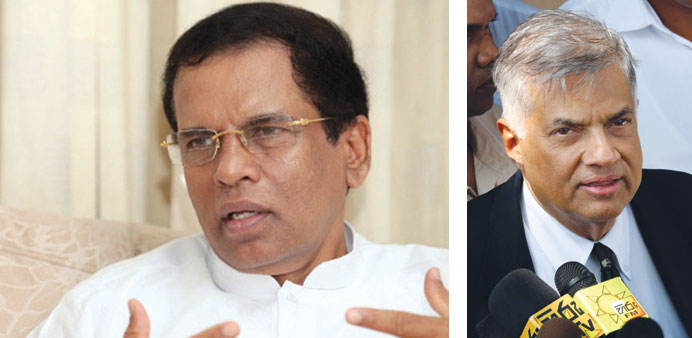By Anthony David, DPA
Colombo
Sri Lanka’s ruling party and the main opposition are co-operating with each other in an unprecedented move to push through major political reforms and fight corruption, setting their sights on a healthier political culture.
Ahead of the presidential elections in January parties were deeply divided, but all main parties in parliament now agree on what is known as the “100-day programme” proposed by country’s new
president Maithripala Sirisena.
Cutting presidential powers, introducing electoral reforms, passing legislation on a right to information, and setting up machinery to fight corruption are all parts of the programme.
Sirisena won the presidential elections on January 8, defeating Mahinda Rajapakse, 69.
Rajpakse’s concentration of power in his own hands and appointment of family members to key positions provoked disquiet among the then opposition but also in his own party.
Sirisena had been a minister in Rajapakse’s government but quit to run against him as the combined opposition
presidential candidate.
That move redrew the electoral map and marked the beginning of the island’s greater political unity.
“We may be able to set an example in the (South Asian) region with the ruling party and the opposition co-operating with each other on resolving outstanding issues,” Prime Minister Ranil Wickremesinghe, one of the architects of the president’s election victory, told parliament.
“Even the longstanding ethnic issue can be addressed, because the minority Tamil parties are co-operating,” Wickremesinghe said.
Ethnic Tamil rebels fought the government in a 26-year separatist conflict in the north and northeast that ended in 2009 with the defeat of the Liberation Tigers of Tamil Eelam.
The run-up to the elections saw a key minority party in the north, the Tamil National Alliance, and the country’s main Muslim party, the Sri Lanka Muslim Congress, campaigning on the same stage for Sirisena. Rajapakse mainly focused on getting support from the majority Sinhalese Buddhist voters by projecting the defeat of Tamil rebels as his success.
Co-operation between the main political parties is a prerequisite for passing constitutional amendments in the 225-seat parliament where no one party has the necessary
150 seats.
“I see this co-operation as a good sign for the future of the country,” said Keerthi Tennakoon, executive director of the Campaign for Free and Fair Elections.
Since independence from the British in 1948, Sri Lankans have been ruled by two main parties alternately, but they have never co-operated to this extent.
The reformers might not have it all their own way, however.
Sirisiena still faces resistance from a small but vociferous group that backs Rajapakse. His supporters are calling for his return as the prime ministerial candidate at the upcoming
parliamentary elections.
“The 100-day programme is a conspiracy to help the pro-rebel parties to gain what they failed to achieve during Rajapakse’s era,” said Wimal Weerawansa, a former minister who is campaigning for the former
president’s return.
As ever, the ethnic issue still looms large.
“Lands occupied by the military are now being released to civilians thereby posing a threat to the army. Sentiments of separatism are being expressed in the north and the international community is trying to interfere in internal matters,”
Weerawansa said.
The government has defended its move to release former lands held by the military as high-security zones to civilians. It said there is no rebel problem and denied allegations that the international community was interfering.
The views expressed by pro-Rajapakse factions could undermine the public’s support for the 100-day programme because 74% of the country’s population are from the Sinhalese ethnic group and are predominantly Buddhists, a group Rajapakse has targeted for support.
Sirisena’s critics already question the strength of his mandate, given that his winning margin in the presidential elections was only about 450,000 votes.
The new government started implementing its programme with a series of measures that have gone down well with the public.
Fuel prices were slashed, government employees’ salaries increased and the price of
essential food items reduced.
Rajapakse’s government had focused on major projects including ports, airports, roads and hotels.
An international airport constructed by the former government has been temporarily shut down due to lack of traffic while a mega port city project closer to the capital estimated to cost $1.5bn has been suspended pending further reviews. Both projects were awarded to a
Chinese company.
A string of corruption and bribery cases have been launched, mostly against Rajapakse loyalists. The Bribery Commission has quizzed more than a dozen former ministers on their assets.
At the end of the 100-day programme on April 23, Sirisena is set to call fresh parliamentary elections, almost a year ahead of schedule.
Premier Wickremesinghe’s United National Party, which backed Sirisena, has the edge, but may need the support of Rajapakse’s Sri Lanka Freedom Party to have a stable
government.
“We are ready to form a national unity government for the next two years with the opposition,” said Wickremesinghe, indicating that Sri Lanka’s new style of politics may endure for some time yet.

President Maithripala Sirisena , PM Ranil Wickramasinghe
